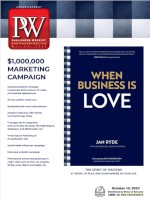Raj Haldar—also known by his hip-hop alias, Lushlife—is the author of the Word Travelers series and P Is for Pterodactyl: The Worst Alphabet Book Ever, a compendium of silent letters. His new picture book addresses another kind of silence. This Book Is Banned (Sourcebooks Explore, Sept.), illustrated by Julia Patton, censors anything remotely objectionable, including avocados, monsters under beds, and the Big Bad Wolf. Haldar spoke with PW about breaking the fourth wall, reaching kids and adults, and silly approaches to serious topics.
After years as a musician, what led you to write children’s books?
Distilling complex ideas and emotions into a form children can understand is an interesting challenge for me. I’ve always had a kernel of interest, and I have on many occasions written [unreleased] folk songs for children. I’d had the idea for an alphabet book about silent letters for quite a while, but about five years ago I started working on it in earnest. P Is for Pterodactyl led me to all these other ideas that have been embryonically in my brain.
Why did you decide to write about censorship?
I’d been thinking about breaking the fourth wall, using the form of the picture book. As a kid, I loved The Monster at the End of This Book, and then I discovered, with my own children, Press Here by Hervé Tullet. I’m always propelled by seeing other people’s awesome stuff. So when my music manager, Peter Bauer, was like, “Hey, have you thought about doing something around book banning?” all of that collided and synthesized in my head. I immediately saw the possibilities of creating a fun, engaging book that got to the heart of why book banning is so problematic.
How do you think children imagine censorship as a concept?
As I was working on This Book Is Banned, I thought about whether a child has heard about the idea of censorship. I framed it around things young readers understand—situational things, like flowers on birthday cakes. When I was a kid, everybody wanted the piece of cake with the flower, so in the book everybody’s fighting over it. All of a sudden, birthday cakes get banned. I won’t give away the ending, but after banning so many things, you start to erode what makes the world exciting. Once you curtail the free flow of information, there’s a deep stagnation of ideas—there’s nothing left.
Why did you avoid direct references to strife around race and gender—even though, in the book, several horses express a bias against unicorns?
I decided to leave the political context of banning aside. I wanted to create a book that spoke to why book banning is dangerous to democracy, not one that was going to get caught up in the bipartisan chatter of our moment. But the unicorns are a reference to the absurd current threats against LGBTQ-related books. I wanted to have that dual level of satire where there’s something for both the grown-ups and the kids.
How did you come to work with Julia Patton, whose collage-style images seem to bounce off the pages?
I had a pretty concrete picture in my head of what this book would look like. I wanted it to be multilayered, with things taped over and cut out for the fourth-wall-breaking aspect. I sent a mock-up to my editor, Kelly Barrales-Saylor, of the unicorn with black tape over its horn, and she thought of Julia Patton, who is based in the U.K.; her art has that textured feel. Not only did she bring the right aesthetic to the proceedings, but she added so much whimsy [such as images on the end pages of characters waving picket signs].
What conversations do you hope This Book Is Banned will spark?
It’s important to me to get This Book Is Banned out into the world, especially seeing all the book challenges this year. It’s obviously become a campaign rather than small pockets of people challenging things, so I’m focusing on getting this book into the hands of kids. I would hope that it can reach the parents who are on the other side of bans, too. There’s a quote from 1984 where Orwell kind of cheekily says, “The best books... are those that tell you what you know already.”
Raj Haldar will attend the author reception, June 6, 5–6:30 p.m.



 Volume 270
Issue 21
05/22/2023
Volume 270
Issue 21
05/22/2023





